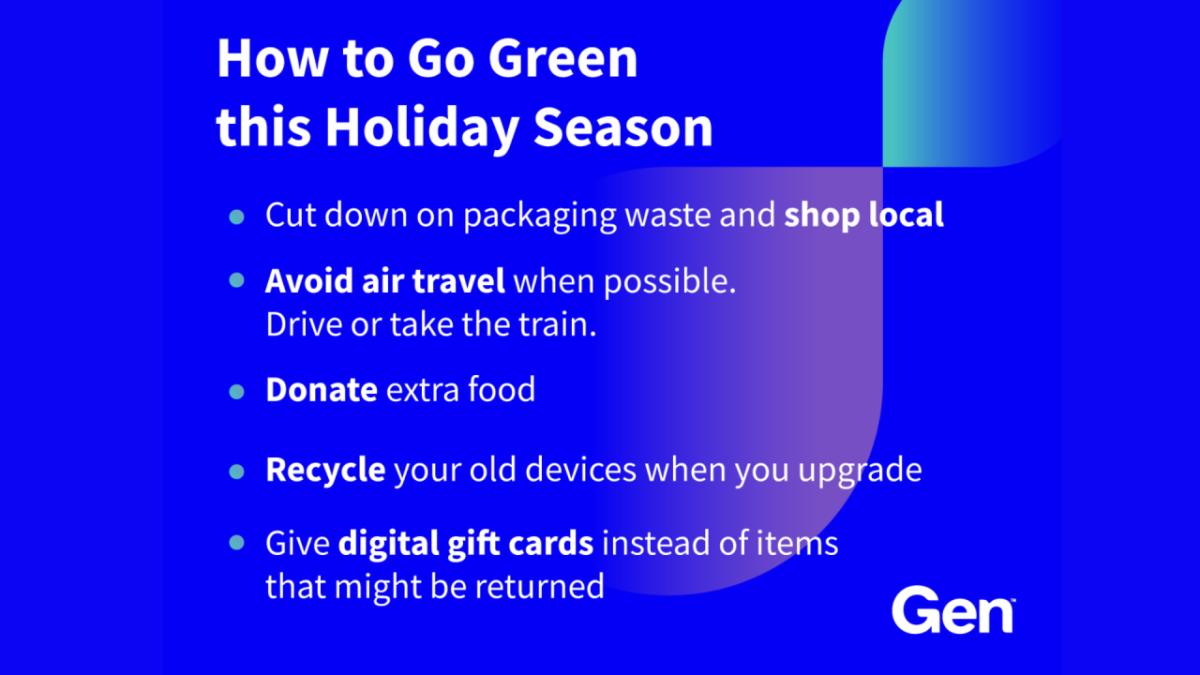How To Make Sustainability Part of Your Holiday Season
By Amanda Davis

The holidays are here again. For many of us, this time of year means gifts, gatherings, eating and good memories as we celebrate with friends and family. The trouble is, all that extra shopping, cooking and travel can add up to a big impact on the planet.
All over the world, waste increases during the holiday season. Stanford University found that Americans generate an extra 1 million tons of waste every week between Thanksgiving and New Year’s. In Ireland, where I live, we produced an estimated 97,000 metric tons of packaging waste alone last Christmas. Those are pretty serious numbers.
Luckily, there are lots of ways we can reduce our environmental footprints without making our celebrations any less special. Let’s take a look at some strategies for making sustainability part of this year’s holiday traditions.
1. Gift Smart
We all have that family member who is hard to shop for. But taking your best guess and including a gift receipt might not be the most Eco-friendly way to go. According to research from Optoro, a company that manages retailers’ returned items, returns from online shopping created 5.8 billion pounds of landfill waste in 2019. The carbon emissions from shipping those returns topped 16 million metric tons. If you’re struggling to find the right gift for someone, here are a few gift ideas that are free of wasteful materials and gift your time: cooking a special meal, planting a tree in their name, offering to clean their house for them or taking them to a show or experience.
2. Shop Locally
Speaking of shipping, online shopping can have serious environmental impacts. The transport of goods across the world is responsible for a huge amount of GHG emissions. According to a Statistic report, 37% of all e-commerce GHG emissions come from the shipping and return of products. The nonprofit Canopy also estimates that it takes 3 billion trees to produce the shipping cartons used globally each year, and of the 86 million tons of plastic packaging produced each year, less than 14% is recycled. Shopping from locally owned stores in your community not only supports your local economy, but also helps avoid the waste and the excess carbon emissions that come from transporting these goods.
3. Consider How You Travel
Christmas is one of the year’s busiest travel seasons. In the Czech Republic alone, thousands of tourists visit Prague in December for the city’s famous Christmas market, and many more trips are expected this year throughout the rest of the EU. Being conscious about how you get where you’re going is a great way to cut down on your environmental footprint. From a sustainability standpoint, driving is preferable to air travel, with mass transit options like buses and trains better still.
4. Recycle Your Old Electronics
The holidays are a great time to upgrade your old devices, with many retailers offering deals on new phones and computers. But what happens to the old ones? Instead of letting your electronics gather dust in your closet, take them to a charity that can re-purpose them, or an e-waste recycler. Stores like Best Buy can help you responsibly dispose of old cables, cartridges and more, and resources like Earth911 can help you find e-waste drop off sites for the bigger stuff. Or better yet—don’t upgrade at all! You should always look into repairing your devices before buying new ones.
5. Be Conscious of Your Food Choices
Food is a big part of all that extra holiday waste. A few simple strategies can help you get the most out of your meals. First, buy in-season foods. They don’t have to travel through a lengthy network of suppliers to reach your market, thereby incurring all kinds of GHG emissions. Plus, they taste fresher! From there, if you resist the temptation to buy more than you need, look up recipes for leftovers, and compost the food scraps from the prep process, you’ll be well on your way to an eco-friendly meal. And if there is anything left over, you can donate perishable items to a local charity. The holidays are also a great time to cut back on meat consumption. Beef production requires 20 times more land and emits 20 times more greenhouse gas emissions than common plant-based protein. Eating less meat is a simple way to make a big impact.
These are just a few of the ways you can go green this holiday season. There are no doubt more things to do in your community that can make a real impact. Let us know what you’re doing to go green this holiday season on X and LinkedIn. We wish you a happy, healthy, and Eco-friendly holiday season.
For more information on how Gen cares for the planet, learn about our efforts to provide clean and safe drinking water to rural communities, how we incentivize our employees to green their homes and how our earth-focused employee resource group Terra engages our employees on environmental action.

